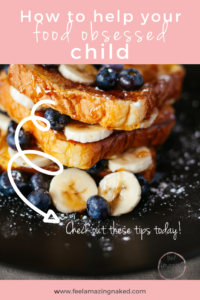Do you have a child who struggles with obsessive thoughts and feelings around food? Do you want to help your child but you aren’t sure where to start? Well, stay tuned, friends, because that’s exactly what we are talking about in this episode.
But first, I need to let you know that my Holiday Health Swap Challenge is happening in November. A lot of folks have already signed up to join us but we definitely have room for you.
If you go to my website, you can sign up for free to join the private community where I will be giving you tips to make healthy swaps this holiday season. The challenge runs November 18-22, 2019 so sign up today! Sign UP HERE.
Are you tired of taking 3 steps back during the holidays? It’s time to take back your health, one step at a time. I hope you’ll join us!
And now, onto the show…
My guest today is Crystal Karges, MS, RDN, IBCLC. Crystal is a Maternal Health Specialist, Child Feeding Expert, and Food & Body Image Coach for Mothers. Crystal is passionate about helping mamas build a peaceful relationship with food & their bodies so they can confidently nourish themselves & their kids and bring joy back to eating.
From Eating Disorder to Food Freedom
Crystal comes from a background of food disorders, having struggled for many years with food and her body.
She says the key to her recovery was thinking about her own husband and children in the future. Until she began her recovery, she hadn’t spent much time thinking about how she had damaged her body or how hard she had been on herself and her health.
She was adamant that her issues with food not be passed on to her children and that was motivation for her to get well.
This set the path for her career, as well. She became passionate about helping moms recover from disordered relationships with food and their bodies.
She strongly believes that women can be the shifting force in breaking damaging generational cycles around food and body image.
Helping Your Child to See Food in a Healthy Way
We all want our kids to be better than we are, to have healthier relationships with food and their bodies than we do.
But are we, in our day to day actions and words, actually teaching them healthier ways of eating and relating to their bodies, or are we unknowingly passing our issues on to them?
If we are struggling with our own bodies or with food, we can become hyper-focused on what we feed our kids instead of focusing on the bigger picture of developing a healthy relationship with food itself.
Instead of counting how many fruits and veggies they eat every day, we need to be focusing on the vocabulary we use when talking to them about food. We need to focus on helping them experience a different outcome than we experienced.
The Child/Parent Food Connection
Crystal believes that we can learn a lot from our own upbringing and our childhood experiences with food.
*Obviously, we can’t blame our adult food issues on our moms or our parents as a whole; just like us, they did the best they could and were under tremendous pressure to get everything right. Let’s show compassion to our parents for trying to do the best they could for us.
For example, Crystal’s parents came from very impoverished families so they had a scarcity mindset when it came to food. Crystal also grew up in a rather large family.
One thing her parents enforced was eating every bite on her plate. This was a reaction to that scarcity mindset brought over from their own lack as children. The problem is that this teaches a child that they can’t trust their hunger cues or what their body is saying.
When parents control every bite their child eats, the child loses autonomy over their eating and they learn to rely on outside cues for when and how much to eat.
Food Curious or Food Obsessed?
How do you know if your child is merely curious about food or if they have an unhealthy food obsession?
Crystal has some pointers for us on how to tell the difference but first, she likes to have folks think of toddlers when it comes to food. Most toddlers can eat and then go play. They can fill their bellies and then forget about food until they get hungry again.
Whereas a food-obsessed child may exhibit some of the following:
- They talk about food incessantly.
- They become preoccupied with specific foods.
- Hoarding, stashing, or hiding food; eating in secret.
Crystal notes that some things we may consider obsessive can be completely normal, such as talking or asking non-stop about a food a friend has but your family doesn’t keep at home. This is normal behavior.
We all know how our kids can go a little crazy at the grocery store, asking for certain cereal or candy. Just because they ask for a certain food doesn’t mean they’re obsessing. Be sure to look for other signs before deciding it’s an unhealthy obsession.
Dealing with Problematic Behaviors
So, you’ve noticed that your child is exhibiting one or more of the behaviors mentioned above and you think it’s time to dig a little deeper. Where do you start?
Crystal recommends first figuring out why the behavior alarms you.
Sometimes, we see things in our child and it brings up experiences from our past that we haven’t fully healed from and we kind of freak out over them. So, before you address these things, try to figure out why it’s causing you so much discomfort.
We all want to protect our kids from being embarrassed or shamed by others because of their body or their food choices. But we have to be careful that we don’t project our wounds onto our children.
Secondly, don’t react in a way that will cause shame for your child.
If you had specific food or body issues in childhood, it is natural for you to not want your child to experience those but sometimes, we tend to respond in ways that bring shame to our child.
Instead, address your fears and feelings without assuming that your child is struggling with the same issues you struggled with.
Avoid statements or questions like, “Are you really going to eat another piece?” “Are you honestly still hungry?” “Why would you choose to eat that?”
Feeding Our Children Is a Relationship
Okay, we’re not going to freak out on our kid when they show clear signs of some kind of issues around food or their body. But what should we do?
Crystal begins with the recognition that feeding our kids is a relationship in itself.
We may see feeding our children as a chore; just another thing to check off at the end of the day. Breakfast, lunch, dinner, snacks. Check.
But in actuality, how we feed our children affects our entire relationship with them. Part of that relationship is learning to trust them with knowing what and how much they should eat. As children, they do have an innate ability to know when and what they need to eat.
Our Responsibilities as Parents
As parents, we are responsible for the food we prepare for our children to eat and when we give it to them.
It’s up to the kids though to decide whether they want to eat and how much.
Crystal likes to say, “Parents provide; kids decide.”
This framework can help you as a parent to figure out if you’re trying to take on the responsibilities of your child when it comes to food. If we try to manipulate their relationship with food, either by withholding certain foods or pressuring then to eat others, we can begin to see conflicts begin.
What if My Child Has an Issue with Food?
If you think your child has an unhealthy relationship with food, take a step back and examine what’s happening and why. This may give you the insight you need to know where to begin addressing the issues.
Back in Episode 44, I talked with Megan McNamee about the vocabulary we use when talking to our children about food. I think this is key to this discussion because we are responsible for introducing our kids to delicious whole foods.
When giving them choices, the choices shouldn’t be between junk and whole foods. They should have choices based on healthy food. We don’t give kids enough credit for wanting to make good choices when it comes to food. When presented with the facts around food and nutrition, most kids will choose to eat mostly good, whole foods.
What Are Your Goals?
When it comes to food, our goal as parents shouldn’t be to get our kids to eat a certain food or even a certain group of foods.
We need to adjust our expectations of how we think our kids should eat and make sure they match reality.
We want to raise kids who feel confident in their bodies and who eat a wide variety of foods. That means we, as parents, need to expose them to different foods, within a “no pressure” environment.
The thing is, if we pressure our kids to eat something, they are more likely to rebel against it and that is not what we want. We don’t want to get into some kind of power struggle over food.
If you are a mom who struggles with past food or body image issues, I hope some of the suggestions in this episode will be helpful for you if you become concerned about your child’s relationship with food. Be sure to listen in to the entire episode to get all the tips that Crystal shared.
There may be many layers of this onion that you have to peel back before you get to all the root causes. If you don’t know where to start, I am here to help.
SCHEDULE A FREE DEEP DIVE CALL WITH ME HERE.
XO,
Amanda
Thank you for listening and reading lovely! How can you support this podcast?
- Apple users, please subscribe and review our show on Apple Podcasts, we make sure to read them all. Android users, be sure to subscribe to our show on Stitcher. As a subscriber, you will get a notification each week a new episode drops! (man I love saying, “Drops”).
- Tell a friend about The Feel Amazing Naked Podcast…they will love you for it! T
- Join the Feel Amazing Naked Community (FREE). I am in here LIVE each week sharing tips, cooking and talking all things confidence and growth.
- Follow me on my favorite social media platform, Instagram.
- Share using the buttons above and don’t forget to tag me (@awalkmyway and @feelamazingnaked) when you do!


